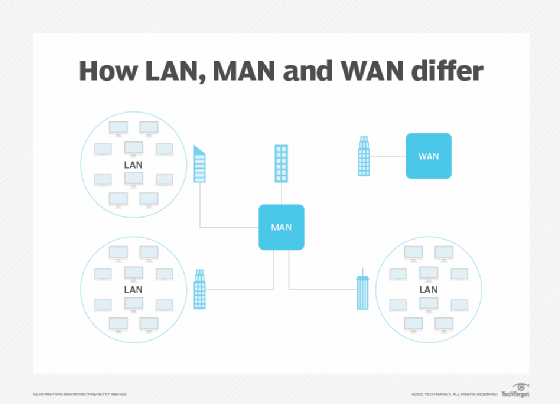What is telecommunications (telecom)?
Telecommunications, also known as telecom, is the exchange of information over significant distances by electronic means and refers to all types of voice, data and video transmission. This is a broad term that includes a wide range of information-transmitting technologies and communications infrastructures. Examples include wired phones, cellphones, microwave communications, fiber optics, satellites, radio and television broadcasting, the internet and telegraphs.
A complete, single telecommunications circuit consists of two stations, each equipped with a transmitter and a receiver. The transmitter and receiver at any station might be combined into a single device called a transceiver. The medium of signal transmission can be using electrical wire or cable -- also known as copper -- optical fiber, electromagnetic fields or light. The free space transmission and reception of data by means of electromagnetic fields is called wireless communications.
Types of telecommunications networks
The simplest form of telecommunications takes place between two stations, but it is common for multiple transmitting and receiving stations to exchange data among themselves. Such an arrangement is called a telecom network. The internet is the largest example of a telecommunications network.
On a smaller scale, examples include the following:
- Corporate business and academic WANs.
- Telephone networks.
- Cellular networks.
- Police and fire communications systems.
- Taxi dispatch networks.
- Groups of amateur (ham) radio operators.
- Broadcast networks.
Data is transmitted in a telecommunications circuit by means of an electrical signal called the carrier or the carrier wave. In order for a carrier to convey information, some form of modulation is required. The mode of modulation can be categorized broadly as analog or digital.
In analog modulation, some aspect of the carrier is continuously varied. The oldest form of analog modulation is amplitude modulation (AM), which is still used in radio broadcasting at some frequencies. Digital modulation predates AM; the earliest form was Morse code. Modern telecommunications use internet protocols to carry data across underlying physical transmissions.
Telecommunications industry and service providers
Telecommunications systems are generally run by telecommunications service providers, also known as communications service providers. These providers historically offered telephone and related services to business and residential users and now offer a variety of internet and WAN services, as well as metropolitan area network and global services.
In many countries, telecom service providers were primarily government-owned and operated. That is no longer the case, and many have been privatized. The International Telecommunication Union (ITU) is the United Nations agency that administers telecommunications and broadcasting regulations, although most countries also have their own government agencies to set and enforce telecommunications guidelines. In the U.S., the Federal Communications Commission (FCC) is the primary regulatory agency. Another important agency is the National Telecommunications and Information Administration (NTIA). It is part of the U.S. Department of Commerce and advises the President regarding telecommunications and information policies and related issues.
A large umbrella of companies provide different types of telecommunications services, including ISPs, telecom equipment providers, wireless service providers, radio and television broadcasters, cable companies, satellite television providers and managed service providers (MSPs).
The three main segments within the telecom industry are manufacturers of telecom equipment, telecom services and wireless communications. The largest sector is telecom equipment, which includes business and personal customer equipment such as routers and modems, transmission equipment such as transmission lines and wireless semiconductors, and analog or digital public switching equipment. Wireless communications is the smallest sector.

Large global service providers include the following:
- AT&T.
- Verizon.
- Nippon Telegraph and Telephone.
- China Mobile Limited.
- Deutsche Telekom AG.
- SoftBank Group.
- China Telecom.
- Telefónica SA.
- Vodafone.
- Qualcomm.
- América Móvil.
Recently, service providers have been focusing on growing services such as data and video, as opposed to voice communication services. By 2012, smartphone use, such as the iPhone, was widespread.
History of telecommunications
The word telecommunications comes from the Greek prefix tele-, which means "distant," combined with the Latin word communicare, which means "to share."
Important telecommunication technologies include the telegraph, telephone, radio, television, videotelephony, satellites, closed computer networks and the public internet.
- 1876. The first telephone was invented by Alexander Graham Bell. This early model required an interpreter, or telegrapher, at both ends. These first telephones were intercom systems, where two phones were connected directly.
- 1877. The invention of the switchboard exchange telephone system enabled any combination of two phone lines to connect and talk with each other.
- 1891. Dial telephones were invented, which bypassed the need for an operator on each call. This made it much quicker and easier to make calls using telephone.
- 1947. The transistor was invented, which led to the development of modern electronics, such as computers and calculators.
- 1948. Microwaves began to be used to transmit phone signals, in places where phone wires did not exist.
- 1960. Phones began to transition from mechanical switching to electronic switching, which enabled features such as voice messaging, speed dialing and caller ID.
- 1984. The Bell System, which provided AT&T with a near-monopoly over telecommunications services in the U.S., was broken up, opening space for competition for other providers.
- 1984. Cellular and personal communications service phone use, which offered mobile communications beyond two-way radio use, was introduced.
- 1990s. Use of the modern internet became widespread.
- 2000s. The first decade of the 2000s saw mobile phones grow increasingly sophisticated. By 2012, smartphone usage was widespread.
- 2020s and beyond. Today, telecommunications is more important than ever, as internet usage continues to grow and the use of mobile communications is virtually everywhere.
The impact of net neutrality
An important issue involving the internet and its availability and use is net neutrality. For well over the past two decades there has been an ongoing debate over whether the internet should be free and open to users and service providers.
Among the concerns was the threat of ISPs and major carriers controlling network speeds associated with internet use. The FCC has been at the center of the debate, which continues to this day, albeit not as significant as in previous years.
The impact of artificial intelligence on telecommunications
Whatever carriers, ISPs, MSPs and other telecom service providers can do today, expect their capabilities to grow significantly using AI. Network intelligence will increase, meaning that networks will be more efficient, provide better and more varied services, provide greater security and adapt quickly to changing business user requirements.
Service providers will benefit through better performance analytics, improved maintenance, ease of customer product and service development, greatly improved network traffic optimization and enhanced fraud detection and mitigation.
The future of telecommunications
Benefiting from the use of AI technology and other advances, the future of telecommunications is bright. The biggest challenge is to deliver secure bandwidth and advanced services to business and personal users when they need it, and at prices they can afford. The ongoing explosion in the creation of data means that telecom resources will be needed well into the future to support the timely movement of information.
Networking involves connecting devices to share resources, while telecommunications refers to the long-distance exchange of data. Explore the differences between networking vs. telecom.
Editor's note: This definition was updated to improve the reader experience.







